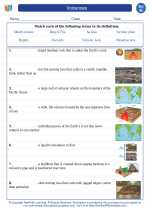Volcanoes
A volcano is a rupture in the crust of a planetary-mass object, such as Earth, that allows hot lava, volcanic ash, and gases to escape from a magma chamber below the surface. Volcanoes can have a wide range of destructive and constructive effects on the environment. They are classified based on their eruptions and shapes. Understanding the science behind volcanoes is crucial in predicting and preparing for volcanic activity.
Types of Volcanoes
There are several types of volcanoes, each with its own distinct characteristics:
- Shield Volcanoes: These are broad, gently sloping volcanoes built by the eruption of low-viscosity basaltic lava. They are known for their relatively calm eruptions.
- Stratovolcanoes (Composite Volcanoes): These are steep-sided volcanoes built by the eruption of viscous lava, tephra, and volcanic ash. They are capable of producing explosive eruptions.
- Cinder Cone Volcanoes: These are the smallest type of volcano and are built from particles and blobs of congealed lava ejected from a single vent.
- Calderas: These are large volcanic craters that are typically formed by the collapse of land following a volcanic eruption.
Volcanic Eruptions
Volcanic eruptions can be explosive or effusive. The type of eruption is determined by the viscosity of the magma. If the magma is highly viscous, it can trap gases, leading to explosive eruptions. If the magma is low in viscosity, the gases can escape more easily, leading to effusive eruptions.
Impact of Volcanic Eruptions
Volcanic eruptions can have a range of impacts on the environment, including:
- Lava Flows: Molten rock flowing down the sides of a volcano can destroy everything in its path.
- Ash Fall: Volcanic ash can cause respiratory problems, disrupt transportation and infrastructure, and impact agriculture.
- Pyroclastic Flows: These are fast-moving currents of hot gas and volcanic matter that can be extremely destructive.
- Climate Effects: Volcanic eruptions can release large amounts of ash and gases into the atmosphere, leading to temporary cooling of the climate.
Study Guide
To study volcanoes effectively, it's important to understand the following key concepts:
- Types of Volcanoes and Their Characteristics
- Causes and Predictors of Volcanic Eruptions
- Impact of Volcanic Eruptions on the Environment
- Historical Volcanic Events and Their Consequences
- Volcanic Monitoring and Preparedness Measures
By mastering these concepts, you can gain a comprehensive understanding of volcanoes and their significance in the Earth's geology and environmental processes.
Hope this helps! Good luck with your studies!
[Volcanoes] Related Worksheets and Study Guides:
.◂Science Worksheets and Study Guides Eighth Grade. Volcanoes
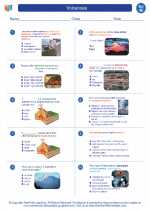
 Worksheet/Answer key
Worksheet/Answer key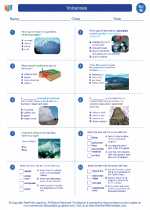
 Worksheet/Answer key
Worksheet/Answer key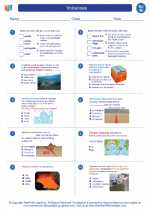
 Vocabulary/Answer key
Vocabulary/Answer key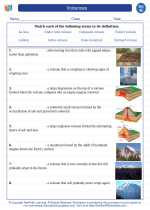
 Vocabulary/Answer key
Vocabulary/Answer key
 Vocabulary/Answer key
Vocabulary/Answer key